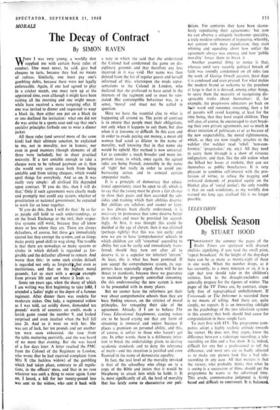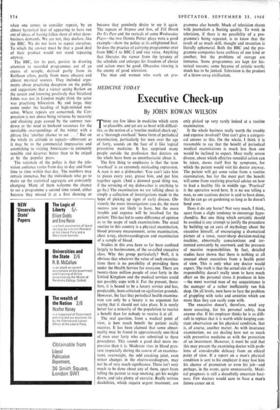Obelisk Season
TELEVISION
By STUART 11001)
THROUGHOUT the summer the pages of the Radio Times are spattered with discreet obelisks signifying, if you read the small print, 'repeat broadcast.' At the height of the dog-days there can be as many as twenty-eight of these in one week. When the number drops, as it has currently, to a mere nineteen or so, it is a sign that you should take in the children's tortoise, look to the draught-excluders and generally prepare for the rigours of winter. The pages of the TV Times are, by contrast, singu- larly free of typographical embellishment. If Crossroads or The Informer is recorded there is no means of telling. And there are, quite simply, no repeats. It is an interesting sidelight on the psychology of the two television systems in this country that both should find cause for congratulation in these simple facts.
To start first with ITV. The programme com- panies adopt a highly realistic attitude towards the viewer. He does not, they argue, know the difference between a videotape recording, a tele- recording on film and a live show. It is, indeed, difficult for any but a professional to tell the difference, and most sets are so badly adjusted as to make any picture look like a bad tele- recording in any case. All that matters is that the viewer, who probably thinks that what he is seeing is a succession of films, should get the programme he wants at the advertised time. This crude, commonsense judgment is firmly based and difficult to controvert. It is balanced, when one comes to consider repeats, by an almost hysterical fear of appearing to have run out of ideas, of having fallen short of what show- business demands. We are not, they declare, like the BBC. We do not have to repeat ourselves. To which the answer must be that a good deal of their product would not stand repeating anyway.
The BBC, for its part, persists in drawing attention to recorded programmes out of an excess of scruple, derived partly from its Reithean ethos, partly from more obscure and almost mystical sources. They included argu- ments about practising deception on the public and suggestions that a viewer seeing Barlow on the screen and knowing positively that Stratford Johns was not in London might think the actor was practising bilocation. By and large, they come under the heading of high-minded non- sense. Where repeats are concerned, the Cor- poration is not above being virtuous by necessity and cloaking gaps caused by the summer run- down or the need to husband resources for the inevitable overspendings of the winter with a phrase like 'another chance to see . . .' But on the whole its attitude to repeats—abhorrent as it may be to the commercial impresarios and astonishing to visiting Americans—is eminently sensible and deserves better than to be sniped at by the popular press.
The rationale of the policy is that the tele- vision audience varies from day to day and from time to time within that day. The numbers may remain immense, but the individuals who go to make up the statistical aggregate are constantly changing. Many of them welcome the chance to see a programme a second time round, either because they missed it at a first showing or because they genuinely desire to see it again. The repeats of Steptoe and Son, of Till Death Do Us Part and the revivals of some Wednesday Plays—the two Dennis Potter plays were a good example—show the policy at its enlightened best. So does the practice of carrying programmes over from BBC-1 to BBC-2 and vice versa. Anything that liberates the viewer from the tyranny of the schedule and enlarges his freedom of choice and action must be good. Obsessive viewing is the enemy of good television.
The men and women who work on pro- grammes also benefit. Much of television shares with journalism a fleeting quality. To work in television, if there is no possibility of a pro- gramme's being repeated, is to know that the result of so much skill, thought and invention is literally ephemeral. Both the BBC and the pro- gramme companies have archives of one kind or another; but the problems of storage are immense. Some programmes are kept for his- torical reasons; some because of artistic worth; much has to be junked. Television is the product of a throw-away civilisation.



































 Previous page
Previous page